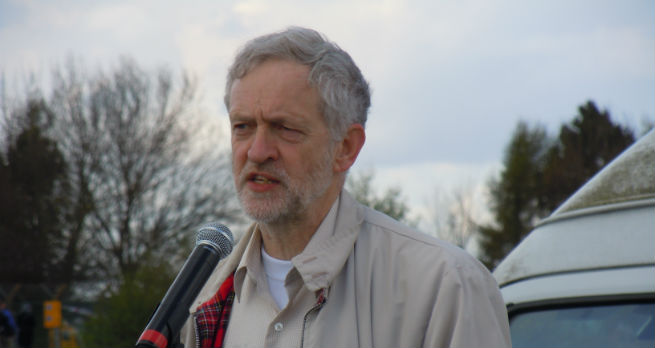In a shocking development, it has been revealed that the Labour Party is apparently excluding already-registered voters from voting in its leadership election. This includes a large number of students, prominent public figures and long-time party members.
The primary targets seem to be people who paid £3 to become “registered supporters”, some of whom are accusing the party of using non-democratic methods to prevent Jeremy Corbyn from being elected leader. The exclusions are apparently premised on the idea that the party has been “infiltrated” by people who do not support Labour’s goals and values – whatever they are.
This follows in the wake of an ongoing campaign by Labour moderates to publicly discredit Corbyn and his supporters, including the threat of a potential political “coup” in the event of his victory.

Mainstream McCarthyites
In an official statement, Labour said it
has a robust system to prevent fraudulent or malicious applications. All applications to join the Labour Party as a member, affiliate or supporter are verified and those who are identified by our verification team as being candidates, members or supporters of another political party will be denied a vote.
The so-called “purge” is part of a broader effort by the party, known as “Operation Icepick”, a project to ensure that all those who are voting hold “Labour values” and are not trying to weaken the party from the inside. As one staffer noted: “we sell Labour membership as being about values and let people forget that they have to sign up to the aims too.”
These concerns are especially prevalent as fears grow that, if Corbyn wins, the losers will mount a legal challenge to have the result ruled illegitimate.
This is widely seen as a direct assault on Corbyn’s supporters, many of whom are new or returning Labour Party members. By allowing anyone who pays £3 to vote, the Labour party has unwittingly opened the door to a serious challenge. A horde of new joiners attracted by Corbyn’s progressive anti-austerity message are now threatening to dramatically recalibrate the trajectory of the party away from its rightward bent of the past two decades.
Labour’s moderates have responded forcefully, and with tellingly scant regard to democratic principles.
At first they restricted their political attacks to mere words, most notably when Tony Blair declared that the party “faces annihilation” if Corbyn wins. But as Corbyn solidified his lead, the moderates' tactics have become even more desperate. Reports speak darkly of MPs threatening to “stage a coup” if Corbyn wins. The Daily Telegraph reported that “Labour MPs are now preparing to go underground to resist the Corbyn regime”.
Yet this most recent strategy has directly crossed the line from democratic to non-democratic. It’s a clear example of a political elite “purging” those who legitimately threaten their power. For this reason, Labour leaders have been called “Mcarthyites” afraid of democracy.
This is a deeply unedifying spectacle – but it’s also part of problem far bigger than the chaotic leadership election. It sheds light on a deeper democratic deficit at the heart of many of today’s established democracies in Europe and beyond.
Today’s centrist and moderate mainstream political parties and leaders increasingly feel emboldened to smear those they view as politically and economically “irresponsible” – and to do so via whatever means necessary.
Moderate authoritarians
Crucially, the spectacle of Labour’s notional “democrats” resorting to strong-arm tactics is not an isolated incident. They are part of a broader anti-democratic trend within established liberal democracies in Europe and beyond.
Such authoritarianism in liberal democracies is nothing new. Europe and the US have a long history of overthrowing elected governments and repressing domestic challenges when it served the interests of national elites. It is part of an ongoing authoritarian “paranoia” that extends from Cold War all the way to the War on Terror.
What makes this different though is the supposed contemporary “right” of centrist politicians to suppress those that threaten their hold on power and conservative pro-market agenda. Specifically, it is a necessary part of “politically disciplining” those individual and groups who dare to challenge accepted free market policies.
This authoritarianism has been on full display throughout the Eurozone crisis, as Germany’s notionally “centre-right” Christian Democrat party demanded that Greece accept austerity conditions – this despite the Greeks people’s decisive vote for the anti-austerity Syriza.
This was nothing short of political authoritarianism. In the words of the German intellectual Jurgen Habermas:
the outcome is disgraceful because forcing the Greek government to agree to an economically questionable, predominantly symbolic privatisation fund cannot be understood as anything other than an act of punishment against a left-wing government.
This centrist repression is ultimately less about economics and more about politics. It is a clear warning to anyone labelled an “extremist“ that mainstream politicians now think it legitimate to go to any lengths to suppress their “enemies” – even if that means being explicitly anti-democratic.
The exclusion of potential Labour voters also illustrates how politically reactionary “moderates” are becoming. As their ideas and credibility come under ever more pressure, they are turning to increasingly repressive measures to fight back. ![]()
This article was originally published on The Conversation. Read the original article.
Rate and Review
Rate this article
Review this article
Log into OpenLearn to leave reviews and join in the conversation.
Article reviews